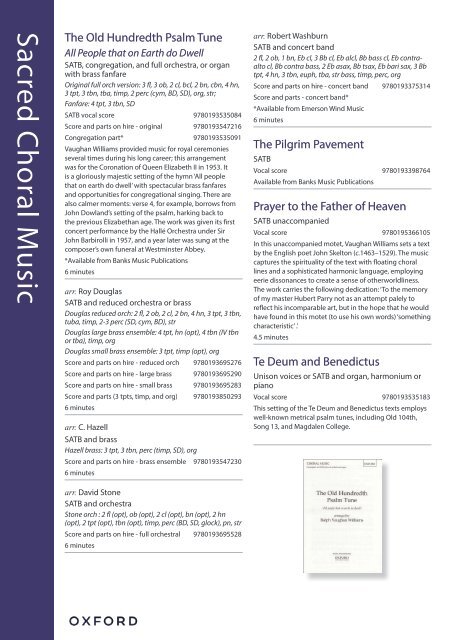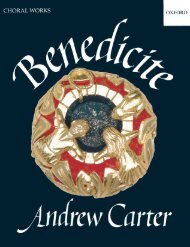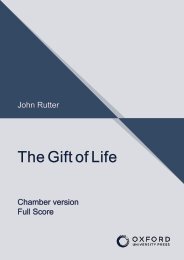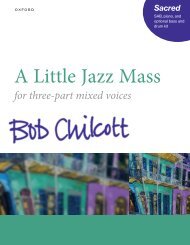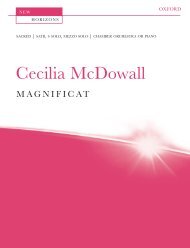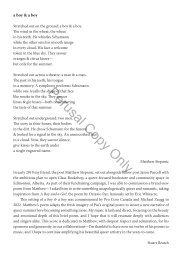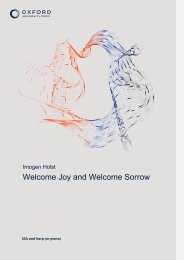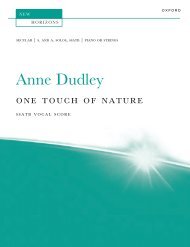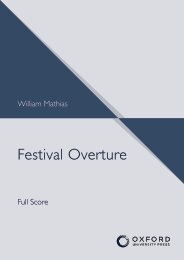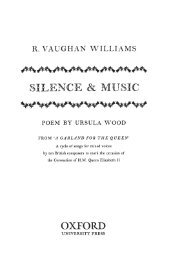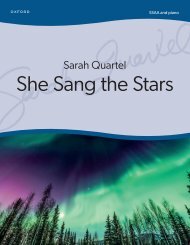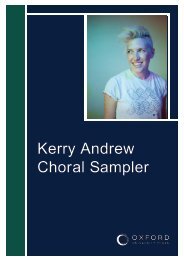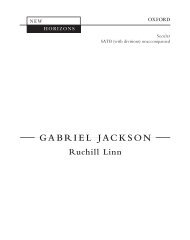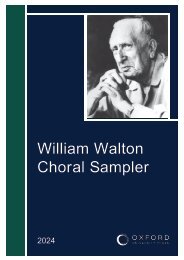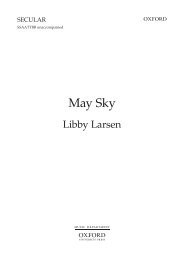Ralph Vaughan Williams Catalogue
Discover the music of Ralph Vaughan Williams published by OUP. ‘No one composer can fully cater to all one's moods...but Vaughan Williams's music comes closest to being the perfect companion on that mythical desert island.’ Alain Frogley, BBC Music Magazine
Discover the music of Ralph Vaughan Williams published by OUP.
‘No one composer can fully cater to all one's moods...but Vaughan Williams's music comes closest to being the perfect companion on that mythical desert island.’
Alain Frogley, BBC Music Magazine
Create successful ePaper yourself
Turn your PDF publications into a flip-book with our unique Google optimized e-Paper software.
Sacred Choral Music<br />
The Old Hundredth Psalm Tune<br />
All People that on Earth do Dwell<br />
SATB, congregation, and full orchestra, or organ<br />
with brass fanfare<br />
Original full orch version: 3 fl, 3 ob, 2 cl, bcl, 2 bn, cbn, 4 hn,<br />
3 tpt, 3 tbn, tba, timp, 2 perc (cym, BD, SD), org, str;<br />
Fanfare: 4 tpt, 3 tbn, SD<br />
SATB vocal score 9780193535084<br />
Score and parts on hire - original 9780193547216<br />
Congregation part* 9780193535091<br />
<strong>Vaughan</strong> <strong>Williams</strong> provided music for royal ceremonies<br />
several times during his long career; this arrangement<br />
was for the Coronation of Queen Elizabeth II in 1953. It<br />
is a gloriously majestic setting of the hymn ‘All people<br />
that on earth do dwell’ with spectacular brass fanfares<br />
and opportunities for congregational singing. There are<br />
also calmer moments: verse 4, for example, borrows from<br />
John Dowland’s setting of the psalm, harking back to<br />
the previous Elizabethan age. The work was given its first<br />
concert performance by the Hallé Orchestra under Sir<br />
John Barbirolli in 1957, and a year later was sung at the<br />
composer’s own funeral at Westminster Abbey.<br />
*Available from Banks Music Publications<br />
6 minutes<br />
arr. Roy Douglas<br />
SATB and reduced orchestra or brass<br />
Douglas reduced orch: 2 fl, 2 ob, 2 cl, 2 bn, 4 hn, 3 tpt, 3 tbn,<br />
tuba, timp, 2-3 perc (SD, cym, BD), str<br />
Douglas large brass ensemble: 4 tpt, hn (opt), 4 tbn (IV tbn<br />
or tba), timp, org<br />
Douglas small brass ensemble: 3 tpt, timp (opt), org<br />
Score and parts on hire - reduced orch 9780193695276<br />
Score and parts on hire - large brass 9780193695290<br />
Score and parts on hire - small brass 9780193695283<br />
arr. Robert Washburn<br />
SATB and concert band<br />
2 fl, 2 ob, 1 bn, Eb cl, 3 Bb cl, Eb alcl, Bb bass cl, Eb contraalto<br />
cl, Bb contra bass, 2 Eb asax, Bb tsax, Eb bari sax, 3 Bb<br />
tpt, 4 hn, 3 tbn, euph, tba, str bass, timp, perc, org<br />
Score and parts on hire - concert band 9780193375314<br />
Score and parts - concert band*<br />
*Available from Emerson Wind Music<br />
6 minutes<br />
The Pilgrim Pavement<br />
SATB<br />
Vocal score 9780193398764<br />
Available from Banks Music Publications<br />
Prayer to the Father of Heaven<br />
SATB unaccompanied<br />
Vocal score 9780195366105<br />
In this unaccompanied motet, <strong>Vaughan</strong> <strong>Williams</strong> sets a text<br />
by the English poet John Skelton (c.1463–1529). The music<br />
captures the spirituality of the text with floating choral<br />
lines and a sophisticated harmonic language, employing<br />
eerie dissonances to create a sense of otherworldliness.<br />
The work carries the following dedication: ‘To the memory<br />
of my master Hubert Parry not as an attempt palely to<br />
reflect his incomparable art, but in the hope that he would<br />
have found in this motet (to use his own words) ‘something<br />
characteristic’ .’<br />
4.5 minutes<br />
Te Deum and Benedictus<br />
Unison voices or SATB and organ, harmonium or<br />
piano<br />
Te Deum in G<br />
SATB (with divisions), opt. congregation, and<br />
organ/orchestra/strings and organ or piano<br />
Orch: 2 fl, 2 ob, 2 cl, 2 bn, 4 hn (2 opt), 2 tpt, 3 tbn, tba (opt),<br />
timp, cym, str<br />
Vocal score 9780193535213<br />
Vocal and instrumental scores on hire 9780193547513<br />
Composed for the enthronement of Dr Cosmo Lang<br />
as the Archbishop of Canterbury in 1928, much of this<br />
striking setting is permeated by emphatically forwardmoving<br />
crotchets. Tonal exploration adds to this sense<br />
of momentum, as does the building of the texture in<br />
the opening passage from powerful choral unison to<br />
resplendent imitation between SATB Decani and Cantoris<br />
voices. Unusually, the piece does not continue to build in<br />
intensity throughout but instead gradually takes on a more<br />
reflective character, with a soft pianissimo chord bringing<br />
it to a restful close. Orchestral and strings accompaniments<br />
arranged by Arnold Foster.<br />
7 minutes<br />
The Song of the Tree of Life<br />
Unison or two-part voices and piano<br />
Vocal score 9780195365610<br />
Adapted from music from The Pilgrim’s Progress, this setting<br />
of words from Revelation 2 is profound and mystical.<br />
Flowing melodies, atmospheric harmonic shifts, and<br />
hushed dynamics give the piece an ethereal quality that<br />
powerfully evokes the religious transcendence described<br />
in the text.<br />
3 minutes<br />
The souls of the righteous<br />
STB soloists and SATB unaccompanied<br />
Vocal score 9780195366068<br />
This unaccompanied motet was first performed at the<br />
dedication of the Battle of Britain Chapel in Westminster<br />
Abbey, London, and has an accordingly sombre tone. It<br />
opens with a haunting soprano solo, and this ethereal<br />
atmosphere continues with unexpected harmonic shifts<br />
and hushed vocal writing. The words are taken from The<br />
Wisdom of Solomon (3: 1–5) and convey death as peaceful<br />
for those who have been ‘righteous’. This motet would be<br />
particularly well suited to funeral or memorial services.<br />
3 minutes<br />
The Twenty-third Psalm<br />
Solo soprano and SATB unaccompanied<br />
Vocal score 9780193535244<br />
Available from Banks Music Publications<br />
Two Chorals from ‘Hodie’<br />
SATB unaccompanied<br />
Vocal score 9780193853850<br />
These two chorals are taken from <strong>Vaughan</strong> <strong>Williams</strong>’s<br />
1954 Christmas Cantata Hodie (This Day) - his last major<br />
composition for choir and orchestra. ‘The blessed son of<br />
God’ is the fifth movement of the original work, and is a<br />
hushed, tender setting of Miles Coverdale’s translation of a<br />
hymn by Martin Luther. The second choral, ‘No sad thought<br />
his soul affright’, is the penultimate movement of the work,<br />
and introduces moments of mystical discordance to the<br />
gentle tone set in the first choral.<br />
The blessed son of God • No sad though his soul affright<br />
5 minutes<br />
Sacred Choral Music<br />
Score and parts (3 tpts, timp, and org) 9780193850293<br />
Vocal score 9780193535183<br />
6 minutes<br />
arr. C. Hazell<br />
This setting of the Te Deum and Benedictus texts employs<br />
well-known metrical psalm tunes, including Old 104th,<br />
Song 13, and Magdalen College.<br />
SATB and brass<br />
Hazell brass: 3 tpt, 3 tbn, perc (timp, SD), org<br />
Score and parts on hire - brass ensemble 9780193547230<br />
6 minutes<br />
arr. David Stone<br />
SATB and orchestra<br />
Stone orch : 2 fl (opt), ob (opt), 2 cl (opt), bn (opt), 2 hn<br />
(opt), 2 tpt (opt), tbn (opt), timp, perc (BD, SD, glock), pn, str<br />
Score and parts on hire - full orchestral 9780193695528<br />
6 minutes<br />
31


